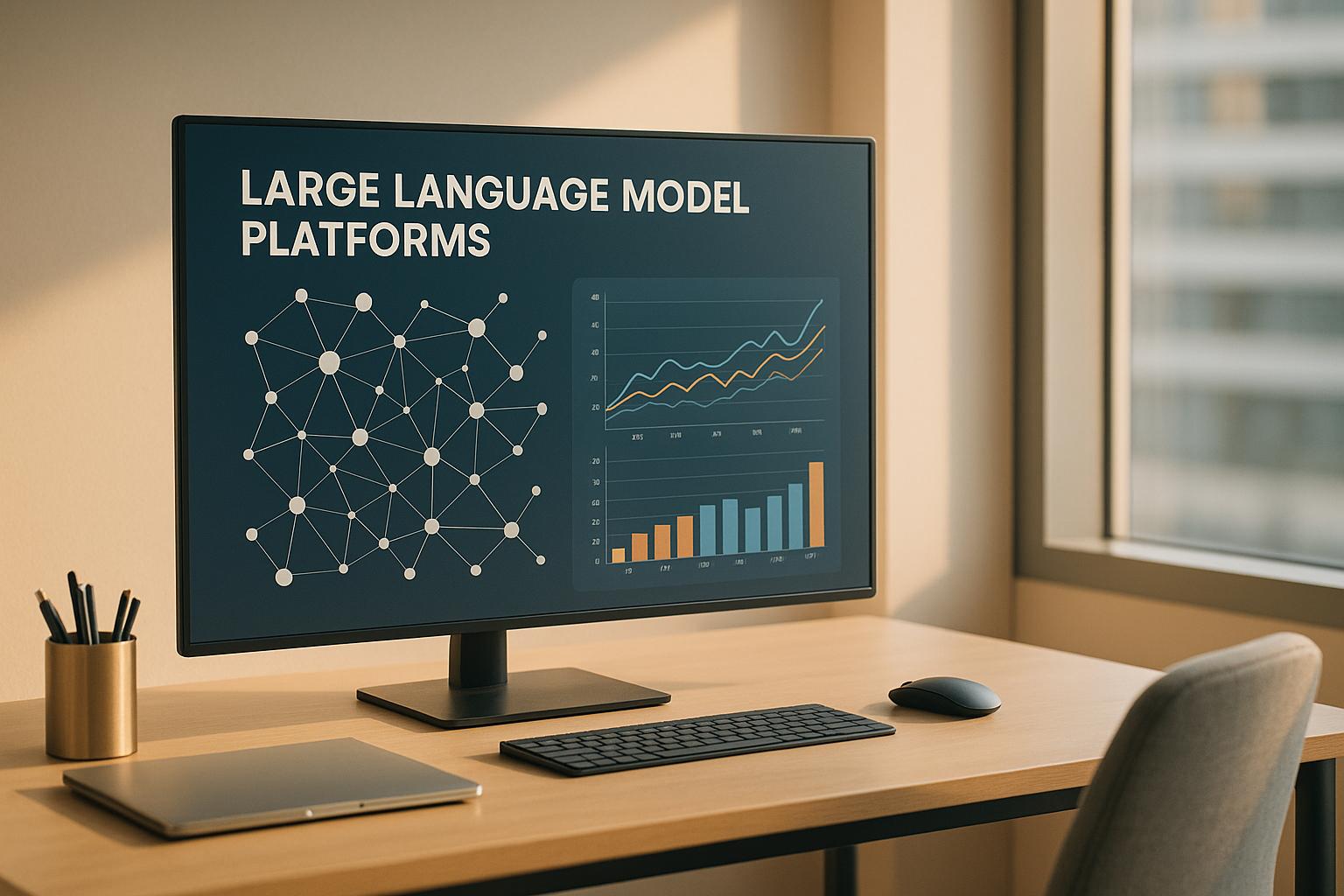
Large Language Models (LLMs) are transforming how businesses analyze data and make decisions. From comparing products to evaluating vendors, these tools streamline complex workflows. However, not all LLM platforms deliver the same results. This article evaluates six key platforms - Prompts.ai, OpenAI GPT, Anthropic Claude, Google Gemini, Meta LLaMA, and Mistral - based on their features, cost, governance, and use cases.
Key Takeaways:
Quick Comparison:
| Platform | Model Access | Pricing Model | Governance Features | Best For |
|---|---|---|---|---|
| Prompts.ai | 35+ models unified | TOKN credits (98% savings) | Enterprise-grade security | Multi-model comparisons |
| OpenAI GPT | GPT-3.5, GPT-4, GPT-5 | Usage-based pricing | Content filtering | Complex reasoning tasks |
| Anthropic Claude | Multiple iterations | Token-based billing | Ethical AI principles | Regulated industries |
| Google Gemini | Multimodal capabilities | Integrated with Google Cloud | Built-in safety filters | Diverse data comparisons |
| Meta LLaMA | Open-source models | Infrastructure costs | Community-driven safety | Customizable, technical projects |
| Mistral | Lightweight models | Resource-efficient | Broad language support | Real-time, low-latency tasks |
Each platform excels in specific areas, making the choice dependent on your workflow, budget, and security needs. For flexible and cost-effective AI orchestration, Prompts.ai stands out, while specialized tasks may benefit from focused solutions like OpenAI GPT or Meta LLaMA.
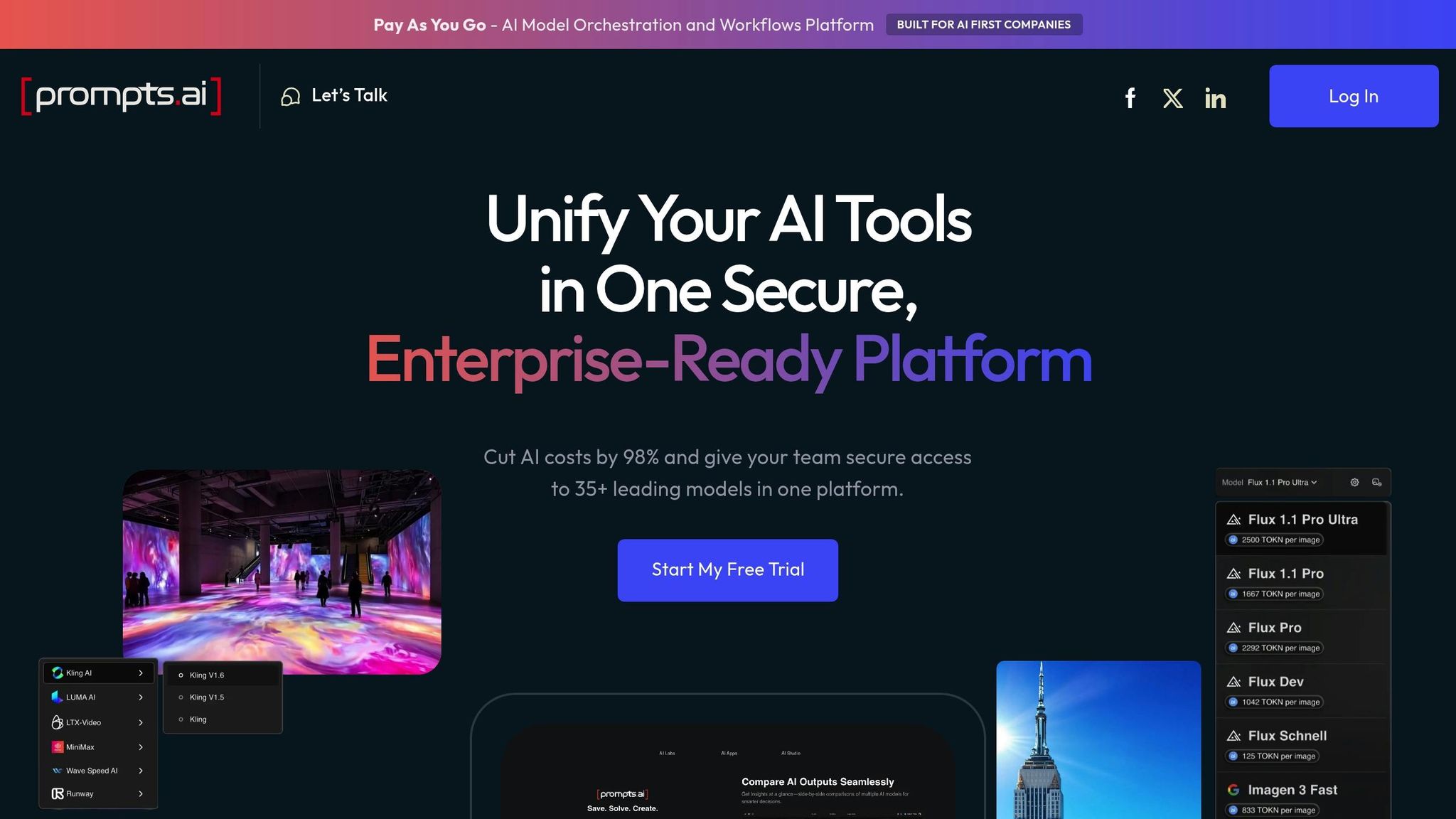
Prompts.ai brings together over 35 enterprise-level LLMs - such as OpenAI's GPT, Anthropic's Claude, Meta's LLaMA, Google's Gemini, and Mistral - under one secure, unified platform. By eliminating the need for multiple subscriptions, it offers a streamlined interface where teams can send identical prompts to different models simultaneously. This makes it easier to determine which model performs best for tasks like generating content, reviewing code, or handling factual reasoning.
The platform’s standout feature is its ability to enable side-by-side model comparisons, boosting productivity by up to 10×. This centralized access not only simplifies comparisons but also eases the technical challenges of managing multiple models.
Prompts.ai automates key processes like authentication, rate limits, and response formatting, ensuring seamless access to both existing and emerging models. Teams can test new models as they are introduced without needing additional API keys or dealing with billing complexities. This streamlined approach allows organizations to stay current without disrupting their workflows.
The platform uses a unified TOKN credits system for real-time usage tracking and detailed analytics, helping businesses cut AI-related expenses by as much as 98%. For organizations, business plans include TOKN pooling, enabling shared credit budgets across teams.
Pricing starts at $0 per month for a pay-as-you-go plan with limited credits. For those requiring more robust features, the Elite plan is available at $129 per member per month, offering 1,000,000 TOKN credits. Annual plans come with a 10% discount for those committing long-term.
For enterprise clients, Prompts.ai includes advanced governance and administration tools in its business-tier plans. These tools ensure compliance with strict industry standards, including SOC 2 Type II, HIPAA, and GDPR. The platform initiated its SOC 2 Type II audit on June 19, 2025, and actively monitors its controls through Vanta. Users can access real-time security updates via the Trust Center, while features like audit logs, user access controls, and compliance monitoring provide transparency and accountability for model usage across the organization.
Prompts.ai is particularly useful for teams needing to evaluate multiple models against specific benchmarks. Its support for custom prompt libraries and versioning makes it an excellent tool for iterative comparison workflows.
The platform has proven its value across a range of applications. For example, Art June Chow, an architect, shared her experience:
"Now, by comparing different LLM side-by-side on prompts.ai, she can bring complex projects to life while exploring innovative and dreamlike concepts".
Prompts.ai holds a user rating of 4.8 out of 5, with many reviewers praising its ability to simplify complex workflows and enhance productivity through systematic model comparisons.

The OpenAI GPT family represents a series of advanced language models designed to understand and generate human-like text. These models, with their ability to process and produce coherent, contextually relevant responses, have become a cornerstone in AI-powered applications. From GPT-1 to the latest iterations like GPT-4, each version has brought enhancements in language understanding, reasoning, and versatility, making them invaluable tools for a wide range of industries and use cases.
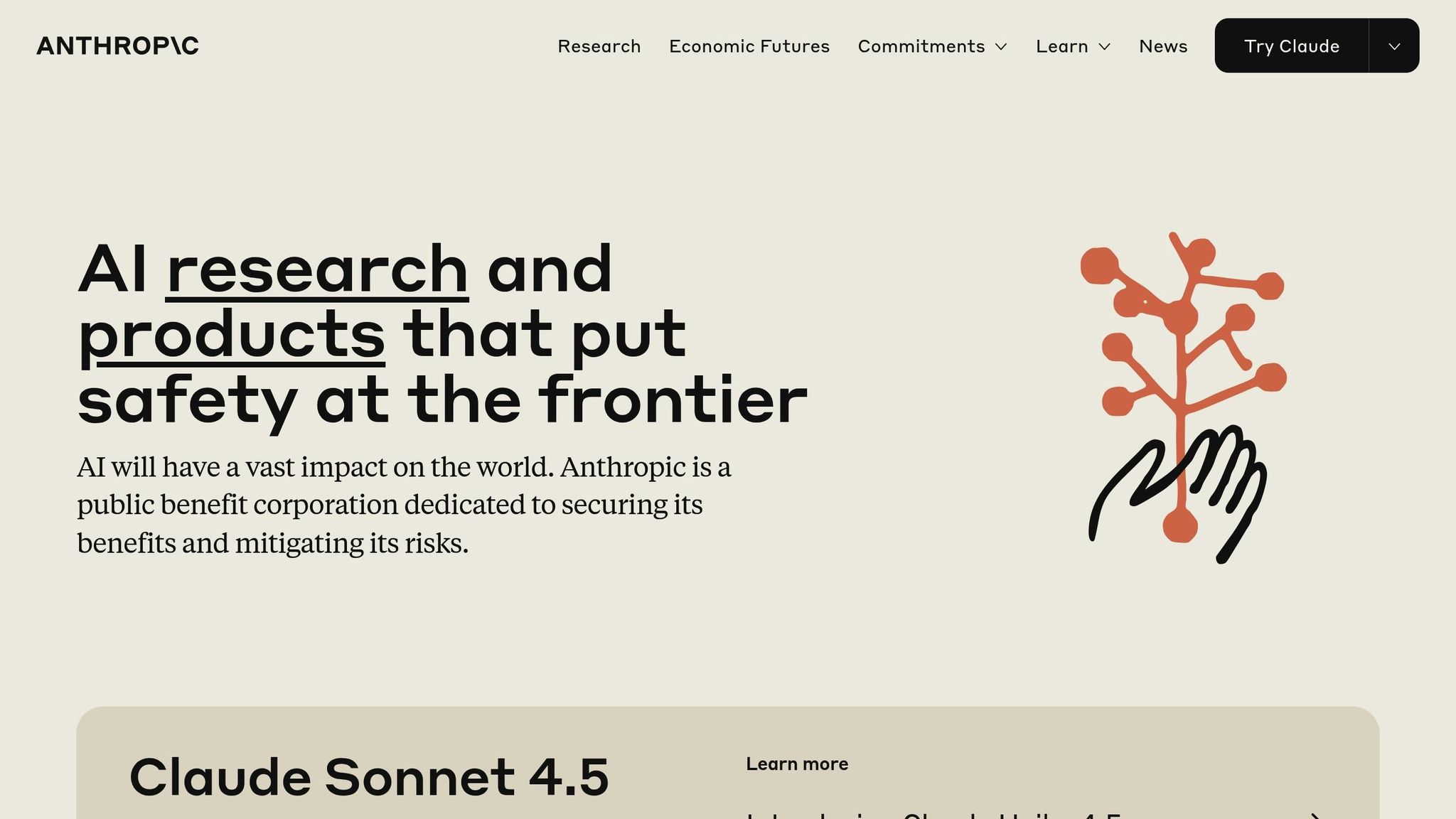
The Claude series from Anthropic places a strong emphasis on safety, ethical considerations, and balanced decision-making. Designed to handle complex analytical tasks, these models are built to provide fair and unbiased perspectives, which is especially important when conducting detailed comparative evaluations. This commitment to ethical clarity ensures reliable performance across a range of analytical needs.
The Claude series includes variants tailored to different performance and cost requirements. One version is optimized for delivering in-depth reasoning and contextual insight, making it ideal for tasks like analyzing complex datasets or evaluating multi-dimensional business decisions. Another, more streamlined version is designed for quicker responses, perfect for routine comparative tasks, while still maintaining dependable accuracy.
Anthropic offers a straightforward, pay-as-you-go pricing model, making it accessible for both smaller projects and large-scale enterprise analyses.
Claude is guided by principles aimed at producing balanced outputs while reducing harmful biases. It acknowledges areas of uncertainty by presenting multiple perspectives. Additionally, organizations can customize the model’s behavior using specific instructions and system prompts, ensuring its responses align with internal standards or ethical principles. These governance features make Claude particularly effective for handling nuanced and sensitive comparative tasks.
The Claude series is well-suited for a wide range of strategic comparisons. In business, it can help evaluate market strategies, assess vendor proposals, or compare competing product features. In academic and research settings, it supports the comparison of methodologies or conflicting studies, ensuring thorough and objective analysis in every case.
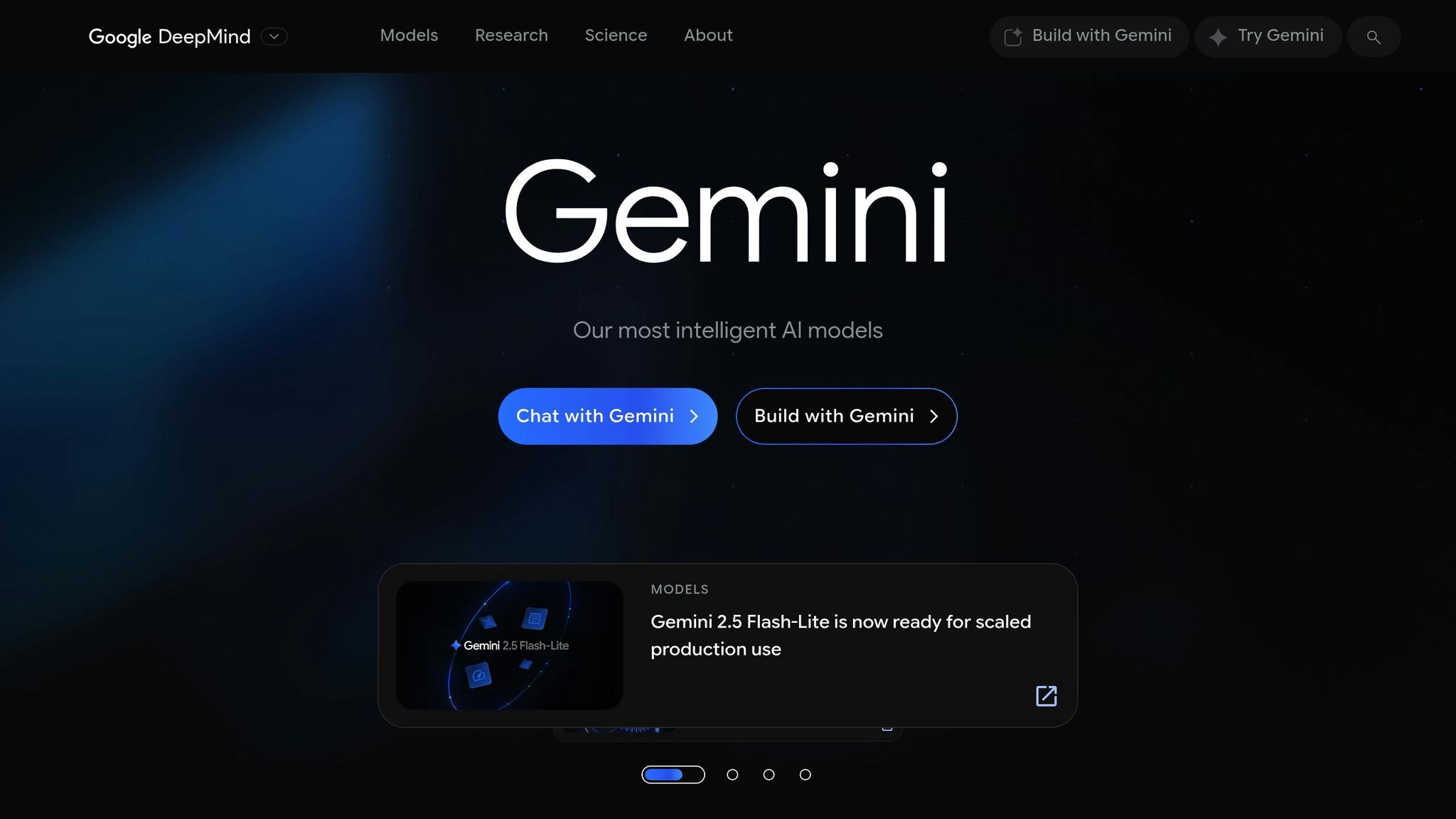
Google Gemini is expected to enhance comparison workflows, though specific information about its versions, pricing, and governance is not yet available. As more details surface, Gemini is shaping up to be a model worth keeping an eye on.
Similar to other new solutions, Gemini's future developments are likely to build on the capabilities seen in platforms like Meta's LLaMA Series.
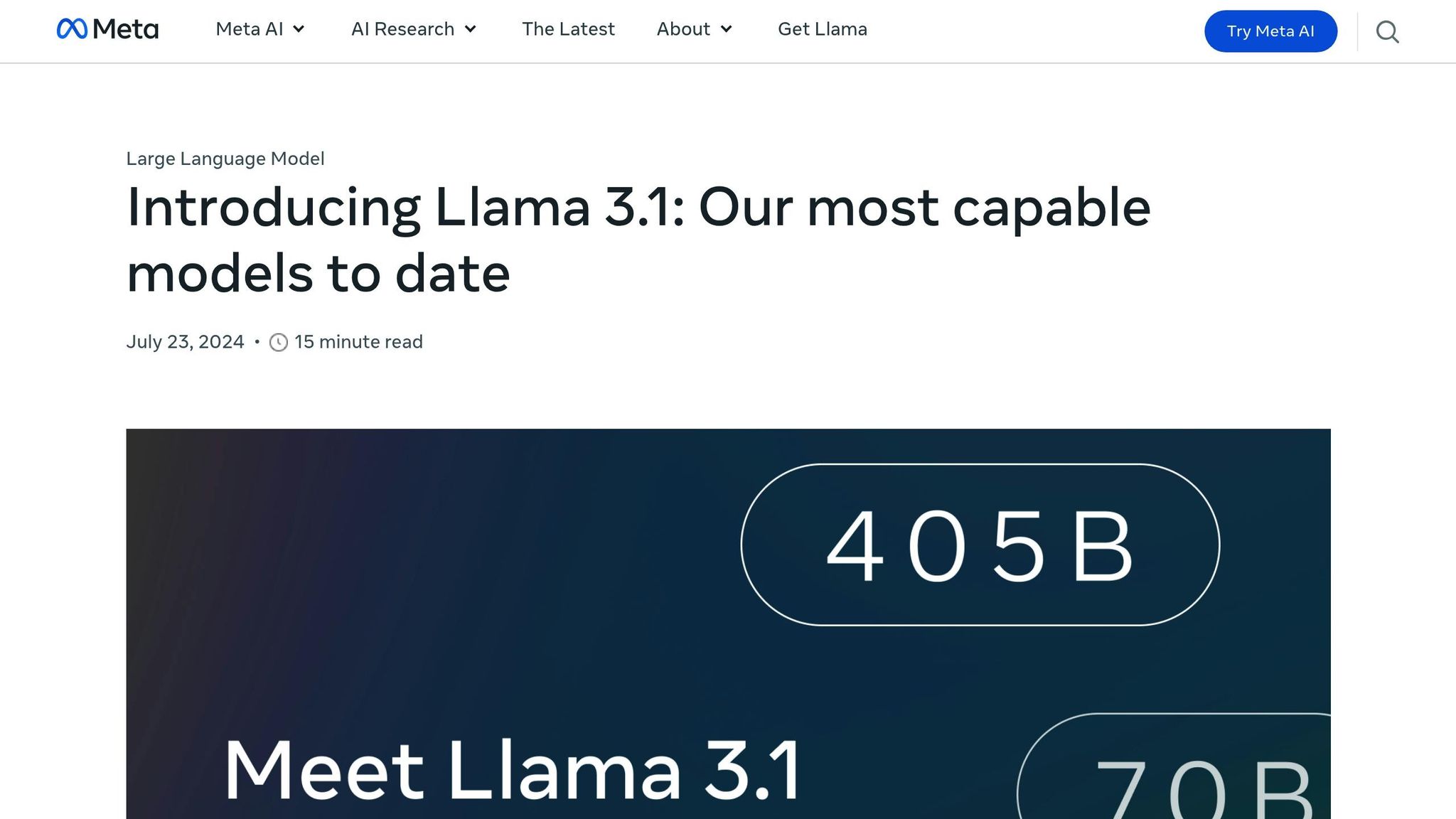
Meta's LLaMA series pushes the boundaries of open-source language modeling, offering researchers tools that are both powerful and transparent. These models are designed to simplify comparison-heavy tasks while making advanced language modeling more accessible.
The LLaMA series includes models ranging from 7 billion to 65 billion parameters, catering to various computational needs. The latest version, LLaMA 2, features both base models and fine-tuned chat versions tailored for conversational tasks. This range allows users to select the model that best fits their specific workflows.
Built with efficiency in mind, the architecture ensures reliable performance, even with large-scale text data. The models excel at understanding context and maintaining consistency over lengthy conversations, making them particularly useful for comparing complex topics or datasets.
Meta has taken a unique approach with LLaMA, offering a research-oriented platform under a custom commercial license. Unlike traditional subscription-based services, LLaMA requires self-hosting, meaning costs are tied to computational resources instead of per-token charges.
This setup offers predictable expenses, especially for organizations conducting extensive comparisons. Costs depend on hardware and cloud resources rather than fluctuating API fees. However, deploying and maintaining the models demands technical expertise, which organizations should consider when evaluating the total cost of ownership.
LLaMA adheres to Meta's Responsible Use Guide, which provides clear guidelines for deploying and managing the models. Built-in safety measures and content filtering features help reduce the risk of generating harmful outputs during comparison tasks.
Meta also openly addresses the models' limitations and biases, enabling users to make informed decisions about their applications. The open-source nature of LLaMA encourages community contributions to improve the platform further.
LLaMA stands out in scenarios requiring in-depth analytical comparisons, offering users full control over deployment and customization. It is particularly well-suited for academic research, policy analysis, and enterprise applications where data privacy and transparency are critical.
The models perform exceptionally well with tasks involving technical documentation, research papers, and structured data analysis. Long-form studies benefit from LLaMA's ability to maintain context and support detailed comparisons.
However, the platform's complexity makes it ideal for organizations with dedicated AI teams and significant computational resources. This ensures that users can fully harness its capabilities while managing the technical demands of deployment.
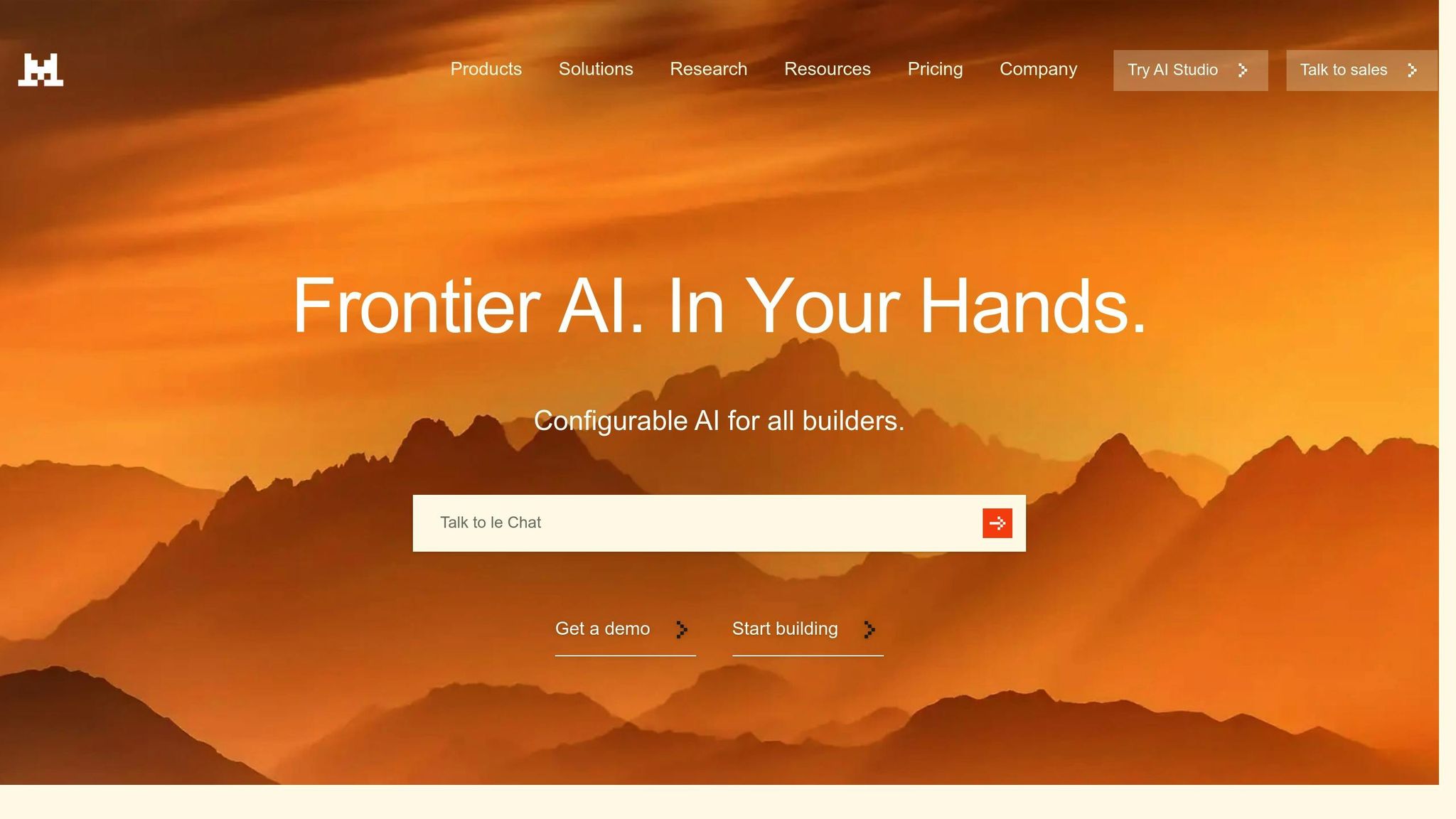
Mistral focuses on delivering fast and efficient language modeling, optimized for resource-conscious and lightweight deployments. Its models are designed to handle diverse comparison workflows with ease.
Mistral offers a range of models, from compact, edge-friendly options to enterprise-level solutions. The flagship model, Mistral Small, is tailored for quick processing, while specialized versions like Codestral and Devstral Small excel in generating code across more than 80 programming languages. Its open architecture allows for extensive customization, catering to varied needs.
Mistral employs a pricing model that prioritizes resource efficiency, helping to keep costs manageable while ensuring predictable scalability. Its open-source framework provides affordable solutions for startups, academic institutions, and research initiatives. For enterprise applications, Magistral Medium supports auditable, domain-specific reasoning tasks, adding value for larger organizations.
Mistral integrates strong safeguards to promote responsible AI usage. It supports multiple languages, including English, French, Italian, German, and Spanish. Additional features include function calling for external tools and APIs, as well as JSON mode for streamlined data handling. These governance tools enhance Mistral's capability to deliver high-performance comparison workflows.
Mistral shines in real-time applications requiring low latency, making it ideal for rapid data analysis and mobile-edge deployments. Its specialized models are well-suited for generating code in a wide array of programming languages. Additionally, the Embeddings API enables advanced text analysis tasks, such as grouping, classification, and sentiment evaluation. This combination of features makes Mistral a strong choice for scalable and cost-efficient API services.
LLM platforms come with specific strengths and limitations, offering organizations a variety of options to match their needs and budgets. Below is a breakdown of the key benefits and challenges associated with each platform.
Prompts.ai provides access to over 35 models in one unified ecosystem, with its pay-as-you-go TOKN credits potentially cutting AI costs by up to 98%. However, businesses deeply embedded in single-vendor setups might face hurdles when adopting a multi-model platform due to integration complexities.
OpenAI's GPT family stands out for its advanced reasoning abilities and compatibility with a wide range of development environments. These models are particularly effective for intricate comparison tasks requiring detailed analysis. On the flip side, they come with higher operational costs and the potential for vendor lock-in, especially for organizations that rely heavily on GPT-4 or GPT-5 for critical operations.
Anthropic Claude emphasizes safety and ethical AI, making it a strong contender for industries dealing with sensitive or regulated data. Its constitutional AI design minimizes harmful outputs, but its cautious approach may limit the creative flexibility needed for specific comparison tasks.
Google Gemini integrates seamlessly with Google's ecosystem, offering robust multimodal capabilities that handle text, images, and code simultaneously. While it’s a powerful choice for comprehensive comparison workflows, organizations operating outside of Google’s infrastructure may face challenges with implementation and data synchronization.
Meta's LLaMA series allows for extensive customization and cost-efficient deployment with predictable infrastructure expenses. However, it requires significant technical expertise to deploy effectively, making it less accessible compared to managed solutions.
Mistral is designed for rapid processing and low-latency operations, which makes it ideal for real-time applications. However, as a newer entrant to the market, it lacks the extensive third-party integrations and community resources that more established platforms offer.
| Platform | Model Coverage | Cost Efficiency | Governance Features | Use Case Suitability |
|---|---|---|---|---|
| Prompts.ai | 35+ models unified | Pay-as-you-go, up to 98% cost reduction | Enterprise-grade audit trails | Multi-model comparison workflows |
| OpenAI GPT | GPT-3.5, GPT-4, GPT-5 | Usage-based pricing | Content filtering and safety | Complex reasoning tasks |
| Anthropic Claude | Various iterations | Token-based billing | Constitutional AI safety | Regulated industry applications |
| Google Gemini | Multiple configurations | Integrated with Google Cloud | Built-in safety filters | Multimodal comparison work |
| Meta LLaMA | Multiple model sizes | Open-source (infrastructure costs) | Community-driven safety | Research and customization |
| Mistral | Small, Medium, and specialized variants | Resource-efficient pricing | Broad language support | Real-time, low-latency applications |
When selecting the right platform, it's essential to align its capabilities with your workflow demands. Each option brings distinct advantages to comparison tasks, making the choice highly dependent on your specific needs.
Prompts.ai stands out with its integration of over 35 models, unified TOKN credit pricing, and enterprise-grade security. It addresses the challenges of modern AI adoption while simplifying tool management.
OpenAI's GPT family shines in handling complex reasoning tasks, making it a strong contender for intricate comparisons, although it comes with higher operational costs.
Anthropic Claude focuses on ethical AI and safe deployment, making it a great fit for industries with strict regulatory requirements.
Google Gemini offers multimodal capabilities, making it ideal for comparing diverse data types seamlessly.
Meta's LLaMA series provides customizable, open-source models, perfect for deep analytical comparisons tailored to specific needs.
Lastly, Mistral is designed for low-latency, real-time responses, making it a strong choice for customer-facing or interactive applications.
For most enterprises, the decision boils down to balancing cost efficiency, model diversity, and governance needs. Platforms like Prompts.ai, which offer unified access to multiple models in a secure environment, are well-suited for organizations seeking flexibility and cost optimization. On the other hand, businesses with specialized technical requirements or existing infrastructure investments may find targeted solutions more appropriate.
Ultimately, the right platform enhances decision-making efficiency and unlocks AI capabilities tailored to your organization's goals and challenges.
When choosing a Large Language Model (LLM) platform for your business, focus on essential factors such as performance, cost-effectiveness, scalability, and security. Opt for platforms that offer comprehensive performance tracking and comparison tools, ensuring the models align with your specific requirements.
Evaluate whether the platform includes features like version management, team collaboration capabilities, and adherence to industry standards such as SOC 2. These features are critical for seamless integration into production workflows. Striking the right balance between these elements will help you select a platform that matches your operational objectives, budget, and security needs, all while delivering dependable AI-driven solutions.
The TOKN credit system offered by Prompts.ai takes a pay-as-you-go approach, allowing you to pay only for the AI services you use. This eliminates the need for fixed subscription fees, giving you greater flexibility and control over your budget while avoiding unnecessary costs.
With real-time usage tracking, you can keep a close eye on your spending, ensuring complete transparency. This feature lets you monitor and adjust your usage as needed, making it a smart option for managing expenses while still benefiting from top-tier AI services.
Prompts.ai offers powerful governance tools designed to keep your AI operations compliant with industry standards while ensuring secure usage of its models. These tools provide the oversight and control necessary to monitor, manage, and enforce best practices effectively.
With these features in place, users can seamlessly integrate AI-driven workflows into their processes, all while staying aligned with essential regulations and maintaining robust security protocols.


